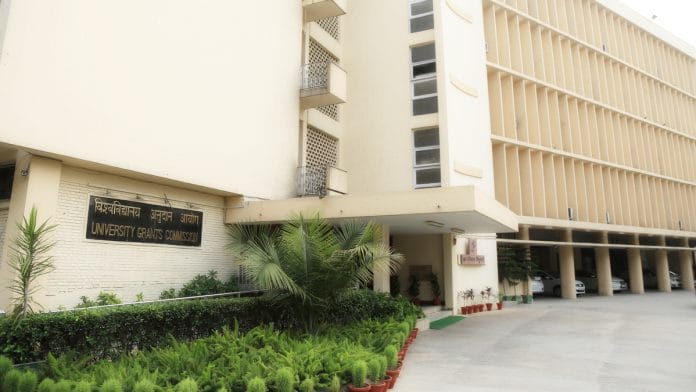New Delhi: Maharashtra, Delhi, Odisha and West Bengal Tuesday opposed, in the Supreme Court, the University Grants Commission’s (UGC) 6 July guidelines asking universities to conduct final-year exams by 30 September.
During the hearing before a bench led by Justice Ashok Bhushan, the four states advanced arguments that ranged from questioning UGC’s authority to the advisory itself and the failure on the commission’s part to take into account the Covid-19 pandemic.
The submissions were made in a batch of petitions, including one filed by 31 students, against the 6 July UGC circular.
The petitioners claim the exam guidelines do not conform to the Union Ministry of Home Affairs’ norms for educational institutions amid the pandemic. The circular exempts first and second-year students from writing final-year papers but not those in the final year.
The bench reserved its verdict Tuesday, after hearing the matter for four hours that finally ended with Centre and states primarily addressing one question — whether UGC has jurisdiction to direct state universities to hold college exams in view of the pandemic.
On its part, the Centre defended the guidelines, contending UGC has the supremacy to issue them.
Solicitor General Tushar Mehta submitted that the guidelines included a standard operating procedure (SOP), which were approved by the health ministry, to ensure the health of students is not compromised.
“Performance in examination brings in scholarship and recognition,” Mehta said. He contended the entire country was in an unlock mode and working. “The students are 21-22-year olds. Can you really believe they will not be going out?” he asked the bench.
Also read: Indian universities didn’t need NEP to change things. But feared UGC too much
‘UGC cannot compel students’
Maharashtra government counsel, senior advocate Arvind Datar, argued UGC can only lay down guidelines and standards for examinations but cannot compel state authorities to hold exams before a particular date.
UGC draws its powers from the Constitution, which deals with “coordination and determination of standards” for higher education, he said.
Even India Institutes of Technology (IIT) have conferred degrees without conducting final exams, Datar told the bench, when asked if not conducting exams will lead to dilution of education standards.
“Not holding exams is not fatal and would not dilute standards,” he asserted.
In college, he added, a student is continuously evaluated from day one. Five semesters in the three-year program have already been completed and the internal assessment for the sixth semester was also over, he informed the bench.
The decision not to hold the exam was based on State Disaster Management Authority’s advice, he said. As for UGC, he argued the body had exceeded its statutory mandate.
The Delhi government, through its lawyer, senior advocate K.V. Vishwanathan, highlighted how the UGC’s July circular is a U-turn from its earlier stand taken in April, which had left it to the states to take a call on conduct of final exams.
“There was no mandatory direction to hold exams. The expert committee of the UGC also recommended that students be evaluated on the basis of internal examination if the Covid-19 situation was not abating,” the senior lawyer told the court.
According to him, the conflicting guidelines have led to confusion. “What about those universities that have been following the April guidelines,” he submitted. The Delhi government had on 11 July directed all state universities to cancel all written online and offline semester examinations, including for final year students.
Also read: UGC cites top universities like MIT, Cambridge to justify decision to hold final-year exams
‘UGC did not consult states, ground realities not considered’
Both West Bengal and Odisha claimed UGC never sought the opinion of states before issuing the guidelines and did so without considering the ground realities existing during the pandemic.
Advocate general for West Bengal, Kishore Datta, submitted that different states cannot be treated on the same platter as every “state has certain peculiarities”. Also, UGC, he added, cannot consider the present situation to be normal. “The state is working on the ground level and knows how the situation is,” Datta said.
According to him, the current scenario allows the state to take a call because it concerns health issues. “It is the duty of the state to ensure public health,” he told the bench.
The advocate general of Odisha, A.K. Parija, argued on similar lines. “Under the prevailing situation, it is not possible to hold a conventional examination,” he submitted. He pointed out to two letters written by the Odisha health minister to the central minister that received no response from the latter.
During the hearing, teachers also got a chance to present their viewpoint. While a group from Maharashtra supported UGC’s stance, another from West Bengal contested it.
Also read: How can universities grant degree without exams?’ UGC sticks to guns on final-year papers







Ye bik gayi hai SC